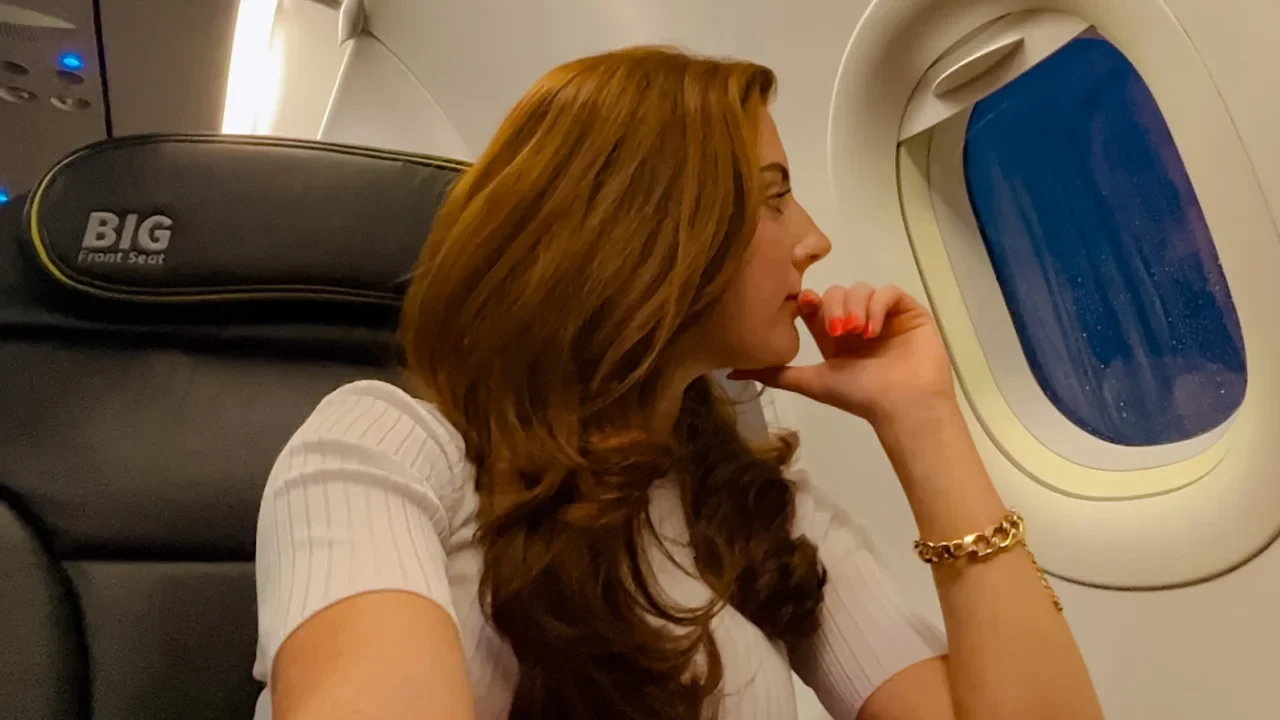Editor's Note: *Sophia Celentano is a content creator and rising fourth year at the University of Virginia majoring in media studies. This summer she is doing a corporate marketing internship at Ogilvy Health. The opinions expressed in this commentary are her own. Read more opinion at CNN. *
As I began my 10-week summer internship within the health group at the ad company Ogilvy, I shared on TikTok what my morning looks like on days when I commute by plane from my family's home in South Carolina to an office in New Jersey.
My untraditional commute provides me with significant financial savings. Rather than spending around $2,000 a month on rent (the average near my office in Parsippany, New Jersey), I book a $100 round-trip flight from Charleston, South Carolina, on the one day a week I work in person. This way, I'm able to live with my parents rent-free. After adding in $100 for Ubers to and from the office and $25 for dinner at the airport (given that I pack breakfast and have catered lunch at the office), I only spend about $900 a month on my commute; much less than I would be spending living near my office full time.
Taking a plane to work as an intern might scream privilege to some, but it's an innovative solution to a real estate market that's unbearable for many of us. Indeed, the median rent in the US fell in May from last year, but not by much: just 0.5%. And rents in many cities are still climbing higher --- Manhattan rents hit another all-time high last month, while cities like St. Louis, Missouri and Columbus, Ohio are seeing huge year-over-year jumps. US home prices, meanwhile, are falling, but mortgage rates are still high, and inventory remains low.
In addition to this commute saving me thousands of dollars, it provides me with notable lifestyle freedom. On the days when I don't commute, I can catch up on family time as I work remotely --- a luxury I may have not been able to experience before the pandemic normalized hybrid work. As someone who values the importance of travel, I genuinely look forward to my weekly adventure. Whether it be through people-watching at the airport or sparking up conversation with the person sitting next to me on the plane, super commuting has allowed me to connect with some inspiring people. In addition to providing me with an eye-opening life experience, instead of putting my paycheck toward rent, I am investing in airline miles that I can utilize for post-grad travel.
Understandably, my commute doesn't come without its challenges. I wake up around 3 a.m. to catch a 6 a.m. flight most Wednesdays, and after finishing my 9-to-5 workday, I then catch a 9 p.m. flight back home, which lands at 11 p.m. As you can imagine, I have encountered a handful of flight delays and cancellations. However, these have only been for my flights home. Given that early-morning flights are very rarely delayed, I have always made it to the office before 9 am. I also know that my commute is not the most environmentally sustainable decision. I would not have decided to travel by plane so frequently if my internship was longer than 10 weeks for this very reason.
Those who saw my TikTok expressed shock at how flying once a week could possibly be cheaper than living in the tri-state area full time. "I think you may be a little delulu," one user responded, "but I support you." Another said "there is no way that flying once a week is cheaper than renting a place with roommates outside of the city." And one observed how "this is so insane for an internship."
Of the many comments I received, those questioning why I would go to such lengths for an internship stood out to me. Their responses seem to show a lack of awareness for the challenges young adults face entering the working world.
Young adults face a significant cost-of-living burden. Many members of Generation Z don't even know if they'll be able to purchase a home in their lifetime. The average age of first-time homebuyers is increasing as many young adults simply aren't able to afford a down payment, according to the National Association of Realtors. The average Gen Z worker has only 2% of their income remaining to save after paying for living needs, data from real estate company Redfin shows. Although slowing, inflation has added an additional burden. It remains high at a time when many students graduate with tens of thousands of dollars in student loan debt.
Not only is my commute saving me thousands of dollars in an economy that's difficult to navigate, it's also increasing my likelihood of being hired at a great company after graduating next spring. In a competitive job market where resumes are scanned by AI systems and some entry-level jobs still require years of experience, internships can make or break whether someone will be hired. It might seem crazy to take a plane to work, but when placed within the context of today's job and housing market, my commute may seem a lot less extreme.
Every generation goes through its challenges, and it's a rite of passage to have to jump through hoops when you're first getting started in the working world. There are hardships generations before me have faced that I will never understand, and I appreciate the sacrifices they have made so my peers and I can have opportunities they did not receive.
However, I think it's time that we peel back the layers on what some have labeled as the generation of entitlement. My generation has had to get creative to navigate today's complicated world. My super commute is ultimately about much more than how I choose to live and work; it's about the challenges my peers and I face as we enter the working world. More importantly than that though, it's about how boldly, passionately and creatively we are determined to navigate those challenges to pursue our goals.












Jump in the discussion.
No email address required.
That's actually pretty clever, am I missing something?
Jump in the discussion.
No email address required.
More options
Context